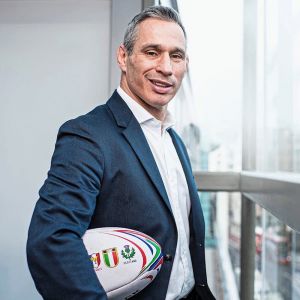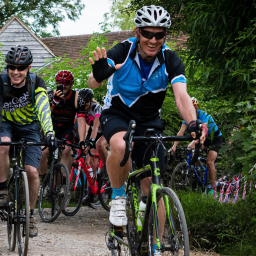Meaningful business (MB:) Tell us a little bit about your background, and what led you to set up League of Tolerance.
Oleksandr Formichov (OF:) Personally, my work is as an entrepreneur and lawyer, but my whole life has been connected to football, as an amateur player, manager and supporter. Originally from Donetsk, I moved to Ivano-Frankivsk following the violent conflict in Eastern Ukraine. There, I started to coach kids, combining the process of athletic development with socialisation and human rights education.
In 2016, with my friends and colleagues – professionals from a diverse pool of spheres – we decided to commit from two to ten hours per week to community volunteering, and established the ‘League of Tolerance’ NGO. We engage with the social education of people through sport, democratic participation and entrepreneurship.
It has been a very inspiring road, full of challenges and new insights. We are now members of the streetfootballworld network, which is famous for its Common Goal initiative, and we were also shortlisted by BeyondSport Global Awards 2020.
MB: How does League of Tolerance create an inclusive environment? Specifically what do you do to make people feel welcome, to help them achieve their potential, etc?
OF: A big part of our volunteering alliance are internally displaced people who, like myself, had to flee difficult situations. We also have representatives from ethnic minorities, LGBTQI+ and people with disabilities. We embrace human diversity and consciously work towards creating a friendly environment for each player or participant by always thinking about flexible progressions to involve people with fewer opportunities, or people who are looking for a safe space for self-expression.
Occasionally, we use temporary positive discrimination actions to find a balance and reach equality. For example, we currently play football using a double-counting approach when a female scores, using this method to see how fast we can increase the quantity of girls and women on our playgrounds! Boys in mixed teams now pass the ball to girls much more often, especially in the offence, which was very rare before.
Another example of inclusion is that we use exercises for tandems, when more experienced players help to empower newcomers, or add mentoring support for young people at risk, which could lead to significantly wider impact than just within the training.
MB: What can businesses do to support organisations focusing on social and economic integration of displaced people, and help increase their positive impact?
OF: Whenever I speak with business representatives I try to understand their strategy and vision, learn what part of society they want to be successful in and find common values that should follow common initiatives.
CSR is not very popular for small and medium Ukrainian businesses, and mostly only bigger companies can afford sustainable social programmes. However, with increased awareness and popularisation of philanthropy, I try to bring several small partners together for one big project and work towards giving them a well-tailored win-win situation. The business environment is extremely competitive, but when stakeholders have similar views of inclusive society development, it’s easier to discuss business interests in a more transparent and deliberate way.
The first thing that businesses need to do, to really support social and economic integration of people in need, is to request a very detailed proposal with clear indicators of expected outcomes from potential partners. If you make smart investments when supporting the achievement of social goals, and select the best efficiency for every penny, nobody will criticise you. I think that kind of a strict business approach would return trust to traditionally intangible and unmeasurable social spheres.
MB: Why is it important to focus on inclusivity and what impact does it have on people?
OF: The biggest plus of inclusivity, I think, is that we involve a diverse group of people and enable informal education by just doing something small together. Living in your own bubble seems more comfortable, but what to do when it suddenly bursts? During COVID-19 times, we see that an inclusive society, where everybody can influence decision-making, is always safer and more protected.
MB: Businesses all over the world are grappling with diversity and inclusion – what can they learn from organisations like League of Tolerance?
OF: While we started off as a grassroots initiative, we gained global recognition by sharing an open heart and working collaboratively with our ecosystem. It is similar for business. Nowadays people don’t just look at the quality of the product or service, but also at their values. The best way to be successful is to adopt a diversity and inclusion policy, which is clear and attractive for your employees and beneficiaries. Customers will understand what differentiates you from your competitors and you’ll create a more loyal and friendly environment for your employees.
___
to join the ‘Game on’ working group, alongside other leaders committed to social impact through sport, apply to become a member of meaningful business here




















